Related Research Articles
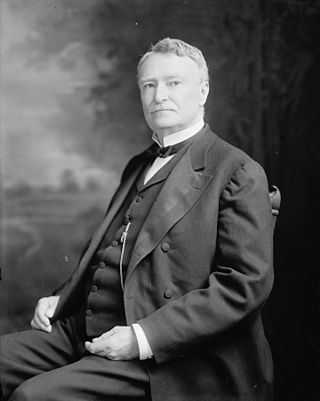
Anselm Joseph McLaurin was the 34th Governor of Mississippi,serving from 1896 to 1900.
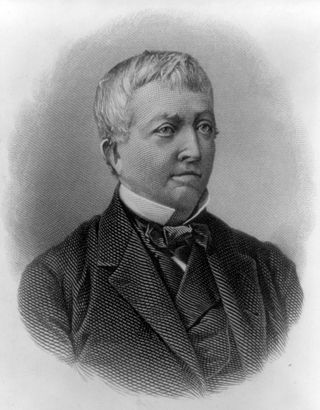
Benjamin Harris Brewster was an attorney and politician from New Jersey,who served as United States Attorney General from 1881 to 1885.

Samuel Lewis Southard was a prominent American statesman of the early 19th century,serving as a U.S. Senator,Secretary of the Navy,and the tenth governor of New Jersey. He also served as President pro tempore of the Senate,and was briefly first in the presidential line of succession.

Albert Gallatin Brown was Governor of Mississippi from 1844 to 1848 and a Democratic United States Senator from Mississippi from 1854 to 1861,when he withdrew during secession.

John Jones Pettus was an American politician,lawyer,and slave owner who served as the 23rd Governor of Mississippi,from 1859 to 1863. Before being elected in his own right to full gubernatorial terms in 1859 and 1861,he served as acting governor from January 5 to 10,1854,following the resignation of Henry S. Foote. A member of the Democratic Party,Pettus had previously been a Mississippi state representative,a member and president of the Mississippi State Senate. He strongly supported Mississippi's secession from the United States in 1861 and sought cooperation with the Confederate States of America.

Sir George Clerk of Pennycuik,6th Baronet was a Scottish politician who served as the Tory MP for Edinburghshire,Stamford and Dover.

James Robinson Graves was an American Baptist preacher,publisher,evangelist,debater,author,and editor. He is most noted as the original founder of what is now the Southwestern family of companies. Graves was born in Chester,Vermont,the son of Z. C. Graves,and died in Memphis,Tennessee. His remains are interred in Elmwood Cemetery in Memphis.
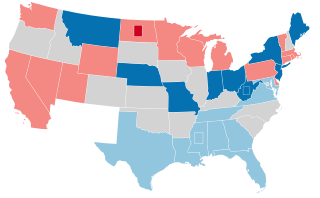
The 1910–11 United States Senate election were held on various dates in various states. As these U.S. Senate elections were prior to the ratification of the Seventeenth Amendment in 1913,senators were primarily chosen by state legislatures. Senators were elected over a wide range of time throughout 1910 and 1911,and a seat may have been filled months late or remained vacant due to legislative deadlock. However,some states had already begun direct elections during this time. Oregon pioneered direct election and experimented with different measures over several years until it succeeded in 1907. Soon after,Nebraska followed suit and laid the foundation for other states to adopt measures reflecting the people's will. By 1912,as many as 29 states elected senators either as nominees of their party's primary or in conjunction with a general election.
More than 1,500 African American officeholders served during the Reconstruction era (1865–1877) and in the years after Reconstruction before white supremacy,disenfranchisement,and the Democratic Party fully reasserted control in Southern states. Historian Canter Brown Jr. noted that in some states,such as Florida,the highest number of African Americans were elected or appointed to offices after the end of Reconstruction in 1877. The following is a partial list of notable African American officeholders from the end of the Civil War until before 1900. Dates listed are the year that a term states or the range of years served if multiple terms.

Hamilton Prioleau Bee was an American politician in early Texas;he was secretary of the Texas Senate in 1846. He served nearly 10 years as representative to the state house beginning in 1849,and for one term as Speaker of the Texas House of Representatives.
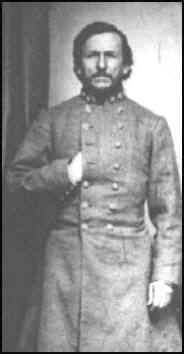
Leroy Augustus Stafford Sr.,was a brigadier general in the Confederate Army during the American Civil War.
James Walker was an Episcopalian bishop who served as the Bishop of Edinburgh (1830–1841) and Primus of the Scottish Episcopal Church (1837–1841).
Edward Turner was a state legislator and public official who served as Justice of the Supreme Court of Mississippi from 1824 to 1832,and again from 1840 to 1843.

Joseph Withers Power was a Mississippi politician and the Secretary of State of Mississippi from 1901 to 1926.
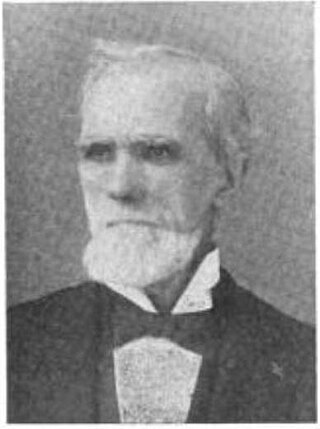
John Logan Power was an Irish-born American politician and publisher,and the Secretary of State of Mississippi from 1896 until his death.
Parmenas Briscoe was an American planter and longtime state legislator in Mississippi. He represented Claiborne County in the Mississippi House of Representatives and Mississippi Senate on and off between 1828 and 1850. He also was the second President of the Mississippi State Senate,serving from 1834 to 1836.
Daniel Williams was an American politician. He was the first Secretary of State of Mississippi,serving from 1817 to 1821.
Colonel Preston Withers Farrar was an American lawyer and Whig politician. He was the Speaker of the Louisiana House of Representatives from 1848 to his death in 1850. He also served in both houses of the Mississippi Legislature.
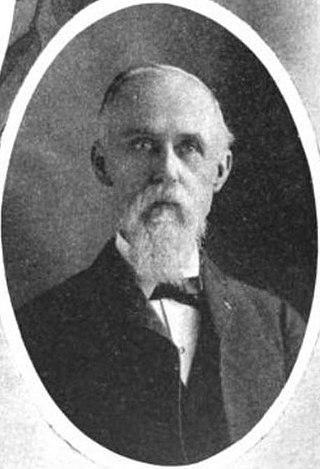
John Prentiss Carter was an American politician. He served in both houses of the Mississippi Legislature and was the Lieutenant Governor of Mississippi from 1904 to 1908.

James Henry Jones was an American politician and lawyer. He served in both houses of the Mississippi Legislature and was the Lieutenant Governor of Mississippi from 1896 to 1900. He also was an officer in the Confederate States Army during the American Civil War.
References
- 1 2 3 Stafford, George Mason Graham (1943). General Leroy Augustus Stafford: His Forebears and Descendants. Pelican Publishing Company. p. 398.
- ↑ Senate, Mississippi Legislature (1821). Journal. p. 29.
- 1 2 Mississippi (1898). Department Reports. p. 92.
- ↑ Capace, Nancy (2001-01-01). Encyclopedia of Mississippi. Somerset Publishers, Inc. p. 112. ISBN 978-0-403-09603-9.
- ↑ Hagstette, Todd (2017-08-10). Reading William Gilmore Simms: Essays of Introduction to the Author's Canon. Univ of South Carolina Press. ISBN 978-1-61117-773-2.
- ↑ Busbee, Westley F. Jr. (2015-01-20). Mississippi: A History. John Wiley & Sons. p. 93. ISBN 978-1-118-75590-7.
- ↑ "Col. John A. Grimball". Clarion-Ledger. 1867-10-06. p. 2. Retrieved 2022-09-01.
- ↑ "Taliaferro J. Lenoir and Laura A. Grimball marriage announcement". The Weekly Mississippian. 1847-12-10. p. 3. Retrieved 2022-09-01.